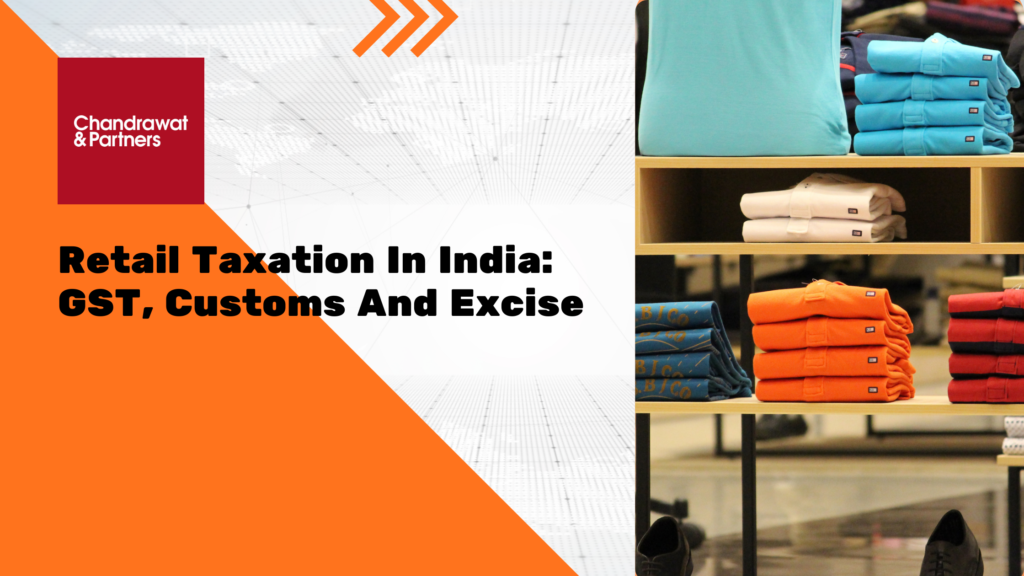Share :
Introduction
The retail sector in India has seen significant change in the long term, owing to technological advancements, shifting consumer preferences, and global monetary integration. The complicated trap of taxation is at the heart of this transition, with Goods and Services Tax (GST), Customs, and Excise all playing important roles. In this blog, we embark on an adventure to untangle the complexities of retail taxes in India, delving into the nuances of each tax component and their impact on businesses.
Goods and Services Tax (GST)
- A summary of GST in India: GST, which was introduced in 2017, was a progressive step toward creating a unified tax framework, replacing a vast number of indirect taxes. The purpose was to streamline tax procedures, reduce flowing effects, and promote a steady development of commodities and services.
- The Retail Sector’s Impact of the GST Structure: GST includes a range of tax rates for various products and services, ranging from 5% to 28%. This arrangement includes recommendations for the retail sector, including estimation strategies and customer behaviour. The GST component Input Tax Credit (ITC) allows merchants to guarantee credits for taxes paid on purchases, smoothing out the tax credit chain.
- Complying and Having Issues: While GST plans to work on tax techniques, consistency might be tough for businesses in any situation. Documenting GST returns and adhering to evolving standards requires a strong structure, which presents challenges for certain firms. Understanding numerous tax slabs and managing consistency costs are typical issues.
Customs Duty in Retail
- Understanding Customs Duty: Customs duty is an important component of regulating imports and goods. It affects the estimation of imported products by containing Fundamental Customs Duty, Extra Customs Duty (CVD), and Integrated Goods and Services Tax (IGST).
- Effects on Shops in Retail: Customs duty plays an important role in determining the final cost of items for shops that deal with imports. It has a direct impact on reviewing procedures and total profits, making it critical for businesses to stay updated on fulfilling customs standards.
- Latest Modifications and Updates: Customs duty adjustments, influenced by professional agreements and government initiatives, have an impact on the retail sector. The most recent versions recall changes in duty rates and try to smooth down customs operations, boosting the ease of doing business.
Excise Duty in the Past and Today
- Context of Excise Duty in History: Excise duty has a long history in India, and it is often waived on goods production. This tax underwent significant modifications throughout time, paving the way for the Goods and Services Tax.
- Development and Modifications to Excise Tax: The shift from conventional excise to GST denotes a huge change. Changes in excise duty influenced the cost estimation and supply chain factors for merchants dealing with excisable items.
- Changes and Their Impact: Changes in excise duty rates and compliance requirements have changed the retail scene. Understanding these developments is crucial for firms seeking to adjust to new tax systems..
Comparative Evaluation
- Comparing the Three Elements of Taxation: Each tax component – GST, Customs Duty, and Excise Duty assume a unique one-of-a-kind role in the retail environment. Examining these elements helps us understand their individual and collective impacts on organizations.
- Interactions’ Impact on the Retail Ecosystem: The interaction of these taxes impacts evaluation systems, supply chain aspects, and overall business operations for retailers. Exploring this confusing web involves a thorough comprehension of every component.
Possibilities and Difficulties
- Technology’s Contribution to Reducing Tax Complexities: As technology advances, shops may equip creative solutions for tax management. technology simplifies taxation complexities, automated frameworks for compliance, information examination for informed navigation, and blockchain for simple supply networks.
- Typical Obstacles for Shops : Retailers frequently face difficulties in dealing with these taxes, going from compliance complexities to the developing idea of guidelines. Keeping up to date with changes is fundamental to relieve gambles and guarantee smooth activities.
- Possibilities for Tax Structure Optimisation: Amid challenges, opportunities arise for retailers to optimize tax structures. Using technology and adopting best practises may help businesses not only comply with rules but also manage their tax liabilities wisely.
Prospective Patterns and Anticipations
- Expected Modifications to Retail Tax Laws: The retail taxation landscape is dynamic, with expected changes in strategies. These progressions might be affected by financial elements, worldwide patterns, and the advancing idea of the retail area.
- Worldwide Patterns and Their Significance India is not free from global trends in retail taxes. Global events, such as changes in currency rates and the acceptance of computerised taxation norms, might have an influence on India’s approach to retail taxation.
- The Effect of Technological Developments: The eventual fate of retail taxation is characteristically connected to technological headways. Arising advancements like artificial intelligence, machine learning, and blockchain present open doors for more productive and straightforward tax the board.
Conclusion
Overall, understanding the retail tax structure in India requires a thorough understanding of GST, Customs, and Excise. Every component contributes to the elaborate interwoven artwork of taxes, defining the present and future of the retail sector. As we anticipate changes, retailers should remain adaptive, applying innovation and accepting best practises to comply with rules as well as clearly position themselves in the ever-changing arena of retail taxes. Maintain your knowledge, be adaptable, and prosper in the one-of-a-kind world of Indian retail.
For more information or queries, please email us at
[email protected]






